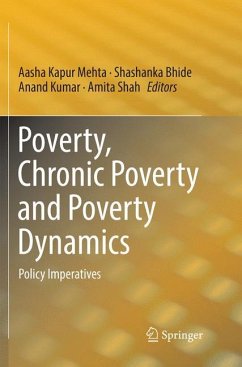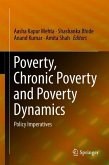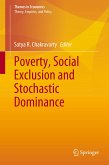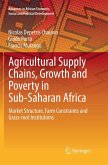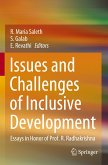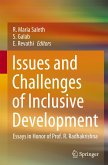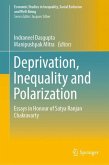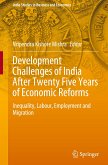This book discusses critical policy issues that need to be addressed if India wishes to achieve the SDG 1 based elusive goal of ending poverty in the country. In its nine chapters, it takes the readers through trends and estimates of poverty in India, explains changes in the way it has been measured over time and the factors that lead to persistence of poverty, draws attention to the fact that hunger is both a cause and an effect of poverty and has gender and age dimensions too. The book revisits strategies that were successful in addressing poverty emanating from situations of conflict, presents a discussion on migration as a critical coping mechanism among poor, analyses the links between ill health and poverty as well as education and poverty to draw attention to the policy imperatives that need attention.
India's report card on poverty remains dismal even though there is recognition of the importance of reducing or eliminating or endingit at both national and global levels. Despite rapid economic growth and improvement on a range of development indicators, an unacceptably high proportion of India's population continues to suffer poverty in multiple dimensions. SDG 1 or "ending poverty in all its forms everywhere" cannot be achieved unless policies and poverty alleviation programmes understand and address chronic poverty and its dynamics. This requires that we estimate and understand the extent of poverty, the factors that lead to people getting stuck in it and the ways this can be addressed. It also requires understanding the dynamic nature of poverty or the fact that many of those who are poor are able to move out of poverty as well as the fact that many others who are not poor become impoverished. These are the issues that are comprehensively examined and addressed in this book.
In addition to students, teachers and researchers in the areas of development, economic growth, equity and welfare, the book is also of great interest to policy makers, planners and non-government agencies who are concerned with understanding and addressing poverty-related issues in the developing countries.
India's report card on poverty remains dismal even though there is recognition of the importance of reducing or eliminating or endingit at both national and global levels. Despite rapid economic growth and improvement on a range of development indicators, an unacceptably high proportion of India's population continues to suffer poverty in multiple dimensions. SDG 1 or "ending poverty in all its forms everywhere" cannot be achieved unless policies and poverty alleviation programmes understand and address chronic poverty and its dynamics. This requires that we estimate and understand the extent of poverty, the factors that lead to people getting stuck in it and the ways this can be addressed. It also requires understanding the dynamic nature of poverty or the fact that many of those who are poor are able to move out of poverty as well as the fact that many others who are not poor become impoverished. These are the issues that are comprehensively examined and addressed in this book.
In addition to students, teachers and researchers in the areas of development, economic growth, equity and welfare, the book is also of great interest to policy makers, planners and non-government agencies who are concerned with understanding and addressing poverty-related issues in the developing countries.
"The review of literature is concise and up-to-date and the issues covered in the analysis are immensely interesting. The value addition is enormously large and it leaves a sense of satisfaction at the end of reading the volume. ... the book is rich in content and with great lucidity, it displays a wide range of interesting issues which will stimulate further research in this field and contribute to policy making." (Arup Mitra, Indian Economic Review, Vol. 54 (1), June, 2019)
"This book evaluates some of the government healthcare initiatives and recommends the changes that will be needed for success. ... This book describes India's educational landscape with plenty of quantitative data and makes recommendations on how to reach educational goals among the impoverished. ... This book would be of interest to scholars and policy-makers, but also to thoughtful lay readers. It provides considerable data for those who wish to dig deeper than the summaries." (Rupa Bose, Indian Mandarins, indianmandarins.com, November 15, 2018)
"This book evaluates some of the government healthcare initiatives and recommends the changes that will be needed for success. ... This book describes India's educational landscape with plenty of quantitative data and makes recommendations on how to reach educational goals among the impoverished. ... This book would be of interest to scholars and policy-makers, but also to thoughtful lay readers. It provides considerable data for those who wish to dig deeper than the summaries." (Rupa Bose, Indian Mandarins, indianmandarins.com, November 15, 2018)

